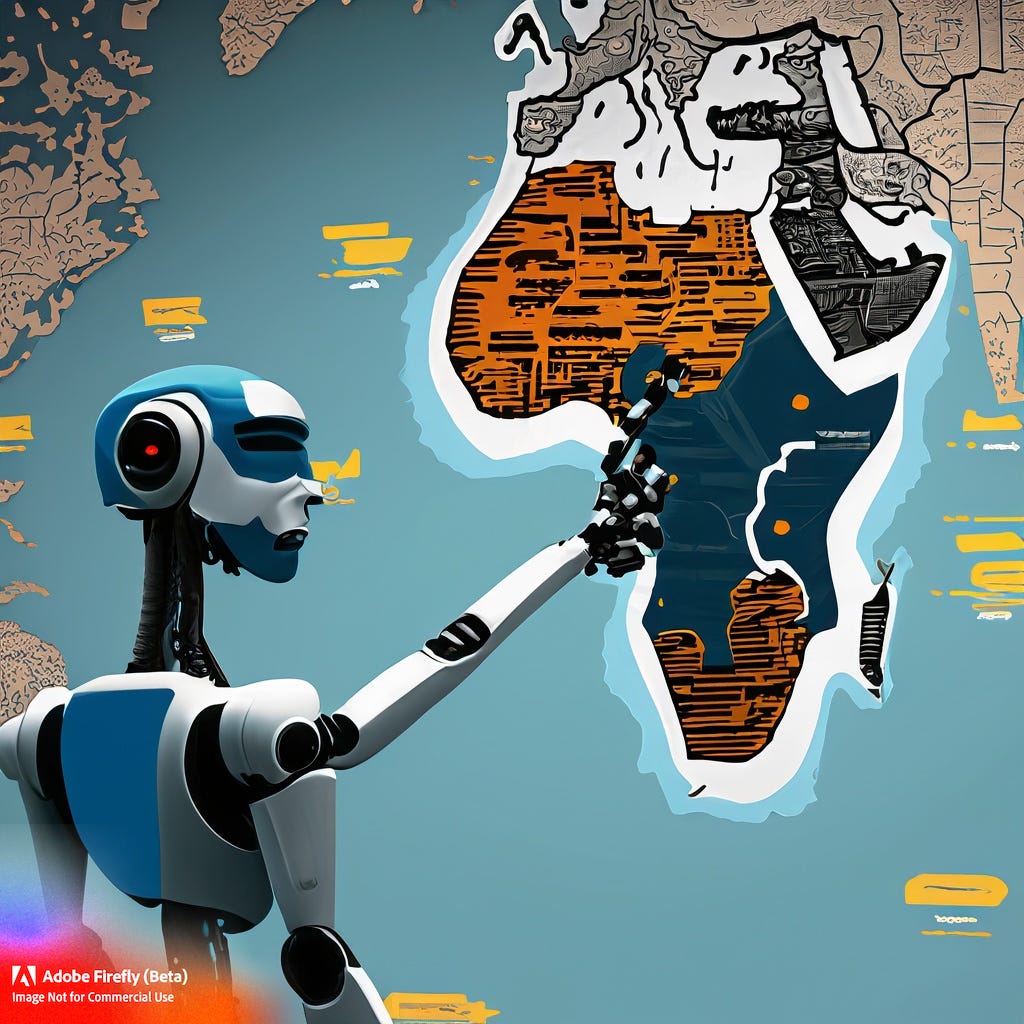I promise you its not clickbait 🙂
So first a confession; I thought climate tech was the preserve of the tree hugging brigade; we all know at least one of them one of them - definitely vegan, favourite drink is a skimmed almond latte and they are always pleasant until you express any doubt in climate change - God help you from that point. I was always scared of engaging them because like a Jehovah’s Witness on Sunday morning, once you open the door to them they will not stop preaching. Actually thinking about it, that is an exaggeration and I really must apologise; to the JW crew.
Anyway………climate tech. This was the new sexy before Crypto and Generative AI and I had ignored it for a while especially when BTC price was rising. But now that crypto is down, we can all think clearly and this paved the way for a road to Damascus-like conversion thanks to Stephen Ozoigbo & Kingsley Ufere; now I am drinking the climate Kool-aid well and don’t believe its a fad.
Colonialism redux
In fact I believe that unless Africa gets on the band wagon, it sets the stage for a new type of colonialism on the continent.
Ngozi, Ngozi, Ngozi!!! How many times did I call your name. Mummy three times. I know many of you will accuse me of sensationalism - these techbros will do anything to get attention. But my people here me out; lend me 6mins and you can then flog me.
To set the scene for the non-believers climate tech is defined as technologies that are explicitly focused on reducing GHG emissions, or addressing the impacts of global warming. If you dig deep, you will find that this is quite broad and can cover a wide swathe of activities: renewable energy generation, software to manage trading of carbon credits, insurance to mitigate the effects of climate change, mobility powered by renewables - the list goes on. Whilst there are climate change deniers, what is more important to us is that the the most powerful man in the world, Joseph Robinette Biden Jr (aka POTUS) ranks climate change as the number one issue facing humanity and his “number on issue”. We all know that where focus goes, cash goes so its no surprise that VC investment in climate tech grew by 81% to $56b in 2021, the year of Joe Biden’s inauguration.
Now I thought that this push was just one of these things we accuse Westerners of doing when they are bored. “Ok now we are out of Iraq, we need a massive initiative that will absorb billions”. This is where Stephen began laughing in ChatGPT and told me one of those tales by moonlight. Here’s the story.
Introduction
As the artificial intelligence (AI) revolution gains momentum globally, Africa stands at a crossroads. There is a real fear that this rapidly advancing technology may widen the economic and technological with the rest of the world. This concern isn't mere fear-mongering - it is rooted in the understanding of the substantial power demands of AI and the continent's existing economic and infrastructural challenges.
AI: The Next Platform and its Power Demand
The general consensus is that AI is poised to become the next big technological platform, much like smartphones; a platform that drives technological innovation and, consequently, economic prosperity. However, what isn't as widely understood is the power demand that comes with AI. As with any machine, energy is required to run processes. In the case of the computations on of a chip – the heart of AI – the more complex the task, the greater the number of processing power required - this means more memory and more energy.
The Crux of the Argument
To excel in AI, there needs to be adequate energy to power the computations and processes required. This demand for energy starts impacting the regular energy supply needed for everyday activities, essentially increasing the overall energy requirement of a city or state. This assumes that these calculations are being processed efficiently at data centers with the necessary infrastructure, hardware, software, and trained personnel to run these complex machines.
Economic Insecurity and Dependency on Foreign Data Centers
Africa, grappling with economic insecurity due to poor governance and adverse macroeconomic conditions, also wrestles with food and data security. The continent relies heavily on countries like Ukraine for wheat and data storage is predominantly handled by Western data centers like Amazon Web Services, Google Cloud, or Microsoft's Azure. This outsourced digital footprint points to a limit in Africa's technological independence and a critical reliance on foreign corporations and governments, a clear echo of colonialism where government policy was determined thousands of miles away.
Am I still fear mongering? Well you are still reading so something must be clicking.
Impact of Energy Independence and Chip Efficiency on AI
It actually gets worse. As with any machine, the operation of a chip – the heart of AI – generates heat, necessitating energy-intensive cooling mechanisms. A big focus areas right now is on energy-efficient chips that require less cooling and can thus accomplish more in processing power. Winning in AI is synonymous with winning in chip technology. This explains the significant investment in chip manufacturing and design globally, as seen with America's Chips Act.
Tying it together
The push towards climate tech isn't merely a venture for sustainability; it is equally about energy independence.
In 2018 computers used 1-2% of the global electricity supply but this is proejected to grow to as high as 30% by the year 2030. It is estimated that OpenAI’s energy consumption in just Jan 2023 was as much as the annual consumption of 175k households in Denmark. Now there is an argument that the use of AI reduces energy consumption faster by making distribution more intelligent in estimating supply and demand and in more efficient cooling of data centers. In the short term, however, my uninformed view is that there will be a net energy increase (pls let me know if there is research to the contrary) that will compete with conventional uses of energy such as heating, light and for powering facilities.
AI and Africa's Basic Energy Needs
Turning to Africa, where the discourse is still about energy for basic needs, the path seems arduous. With the premise that whoever wins in energy, wins in AI, there's much to do. For instance, OpenAI's Rubik's Cube-solving robotic hand required 2.8 gigawatts hours or the power equivalent to running three nuclear power plants for an hour. Nigeria’s power production typically hovers around 4.0 gigawatts (compared to 1.2million in the USA) so we have no capacity to think about artificial intelligence unless we decide to depend on candles for light and use knife and fork for any manufacturing endeavor. Yet many in my beloved country are celebrating the signing of an electricity bill that accelerates privatisation of the market. This is akin to celebrating the privatisation of local transport when others are planning on going to Mars. We have bigger problems.
The Silver Lining: Renewable Energy
Fortunately, there is hope in renewable energy, as seen in the strides made by large US corporations like Apple and serious countries like Morocco where 4GW of its 11GW productive capacity is renewable. Let me double click on that - Nigeria’s total productive capacity is what Morocco has just for renewable. By incorporating wind, hydroelectric, and solar power into their energy strategy, they have laid out a path that can be replicated by others. And its a path that we must follow
Looking Ahead - Africa at a crossroad
To avoid a repeat of history, Africa must raise its ambitions beyond marginal power generation increases. Dependence on foreign capacities may seem cost-effective due to economies of scale, but recent events such as the COVID pandemic have highlighted the necessity of resilience and some degree of independence. As nationalism rises globally, it's essential for Africa to wake up and recognize the need for self-sufficiency in this technologically advanced era. While the precise path forward remains uncertain, the first step is undoubtedly acknowledging the challenges at hand and not pat ourselves on the back for bringing ourselves to the 20th century. Morocco has shown what long-term planning and a executing on sound policy can achieve. Hopefully others will follow.
Otherwise one fears for the future.
Hopefully next week I will do a follow up with how one can catalyze the movement to renewables but if anyone already knows the answer just slide in to my DMs.






This struck a chord !!
Energy is the pathway to data power!!!
There is a lot to unpack here.... Jezzz